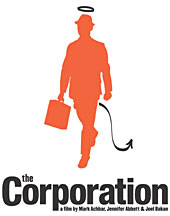The Corporation
Maya Khankhoje
Maya Khankhoje firmly believes that the power of impersonal corporations
can be offset by corporations of people.
THE CORPORATION: The Pathological Pursuit of Profit and Power by Joel Bakan
-internationally recognized legal scholar- was the source of the eponymous two-and-a-half
hour documentary film that both firms-up the seat of your pants as well as your
sense of indignation. Mark Achbar (Manufacturing Consent: Noam Chomsky and the
Media) produced and directed the film, and Jennifer Abbot, documentary film
maker and cultural activist, co-directed and edited it. Bart Simpson, member
of the Canadian film community, was the main producer. As if the worth of its
creators were not enough to validate the worth the film, The Corporation includes
interviews with luminaries such as Vandana Shiva, Indian scientist and activist,
Michael Moore, academy award winning documentary filmmaker, Oscar Olivera, Bolivian
anti-water privatization activist, Anita Roddick, founder of The Body shop,
Naomi Klein, Author of NO LOGO, Milton Friedman, Nobel-Prize-winning economist,
Peter Drucker, management Guru, Noam Chomsky, MIT professor, Maude Barlow, Chairperson
of the Council of Canadians and many more.
 The
Corporation traces the inception of the corporation in the mid-1800's. The 11th
Amendment to the US Constitution, aimed at precluding slavery and curbing the
power of corporations, ironically allowed corporations to enslave people by
empowering them to pursue their self-interest, a privilege not enjoyed by labour
unions.
The
Corporation traces the inception of the corporation in the mid-1800's. The 11th
Amendment to the US Constitution, aimed at precluding slavery and curbing the
power of corporations, ironically allowed corporations to enslave people by
empowering them to pursue their self-interest, a privilege not enjoyed by labour
unions.
The film recapitulates everything and much more than we have ever wanted to
know about corporations: how they meet the clinical guidelines established by
the WHO for the definition of psychopaths, to wit, how they are self-interested,
inherently amoral, callous and deceitful. How they breach social and legal standards
to get their way and yet suffer no guilt while mimicking the human qualities
of empathy, caring and altruism. How they defy common sense by claiming to "own"
what properly belongs to no one, or everyone, that is plants, animals, genetic
defects (cystic fibrosis), natural resources such as water, people's DNA and
even such popular songs as "Happy Birthday". It is also thanks to
corporate irresponsibility that American cow's milk, touted as good for the
health of growing children and pregnant and post-menopausal women, is laced
with rBGH, a synthetic hormone banned in Europe and Canada, whose use also entails
the administration of antibiotics to cows and hence to the population at large.
Many people know that corporations play an important role in the genesis of
wars, but few people are aware of the depth of their complicity in the business
of genocide. IBM assisted the Third Reich in keeping a strict and orderly count
of Jewish prisoners, their whereabouts and the grisly details of their death.
Corporate ethics, or lack thereof, permitted a media celebrity like Kathy Lee
Gifford to keep slaves in Chinese sweatshops and Wall Street brokers to exult
during the 9/11 tragedy at the soaring price of gold.
However, not all is gloom and doom in the corporate world. Corporations might
claim to be legal personalities but they are actually run by real human beings
whose heart and conscience sometimes wake up from sleep mode. Anita Roddick
founded the Body Shop, a cosmetics company with explicit environmental and profit-sharing
goals. Ray Anderson, CEO of Interface, the world's largest commercial carpet
manufacturer, had an environmental epiphany and reorganized his 1.4 billion
dollar company in a more environmentally friendly manner.
Critics of the overwhelming power of corporations have been numerous and forceful.
Jane Akre, former reporter of Fox tried to caution the public about the synthetic
hormone rBGH used in cows and was fired for her efforts, won a suit against
Fox, then lost it again on a technicality when Fox appealed. Elaine Bernard,
Director of the Labor Program, Harvard Business School, makes a case for morals
over markets and suggests the need to determine what should and shouldn't be
bought or sold. Maude Barlow, of the Council of Canadians, makes a plea for
a re-definition of our relationship to nature, corporations and controlling
institutions. Oscar Olivera, Bolivian privatization activist, trusts in the
people's capacity for "reflection, rage and rebellion". And Vandana
Shiva, physicist, ecologist, feminist and seed activist, believes that bluffs
can be called eventually to make tables turn. And she has done just that, by
creating a bank of indigenous seeds in India to protect farmers from corporately
owned terminator seeds.
The Corporation is not meant to be easy or "entertaining". After
watching this film, we cannot just walk out breathing a sigh of relief. We are
compelled to act, to wrest back the word "person" from this legal
personality and claim it back as our own. To rise and incorporate into the largest
corporation of persons ever in order to defeat the monster our impersonal society
has created.
Down with the old corporation. Long live the new one.
END
 The
Corporation traces the inception of the corporation in the mid-1800's. The 11th
Amendment to the US Constitution, aimed at precluding slavery and curbing the
power of corporations, ironically allowed corporations to enslave people by
empowering them to pursue their self-interest, a privilege not enjoyed by labour
unions.
The
Corporation traces the inception of the corporation in the mid-1800's. The 11th
Amendment to the US Constitution, aimed at precluding slavery and curbing the
power of corporations, ironically allowed corporations to enslave people by
empowering them to pursue their self-interest, a privilege not enjoyed by labour
unions.